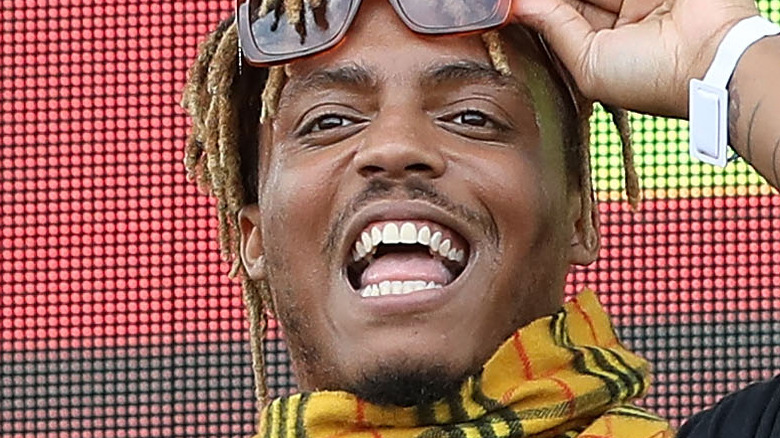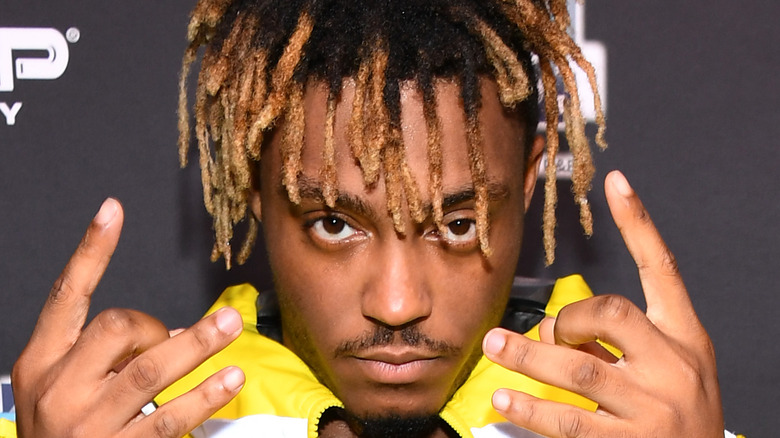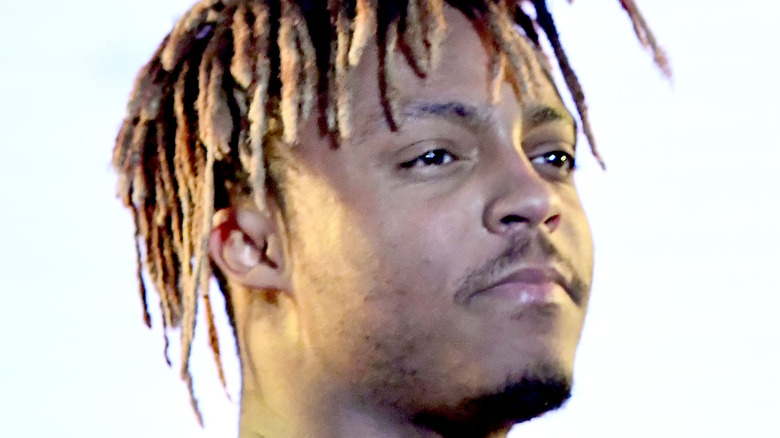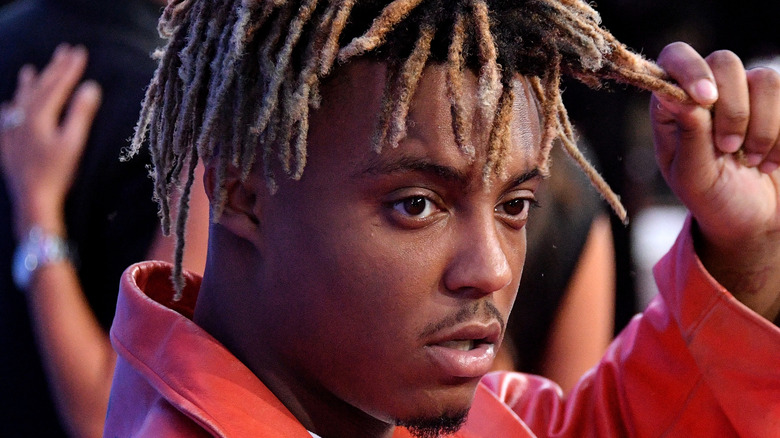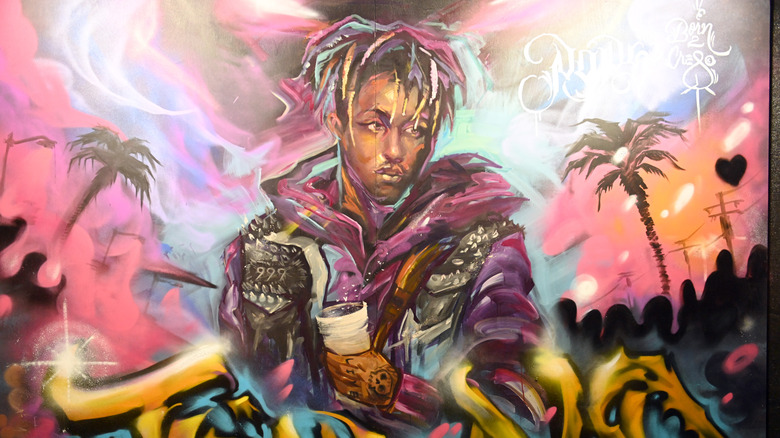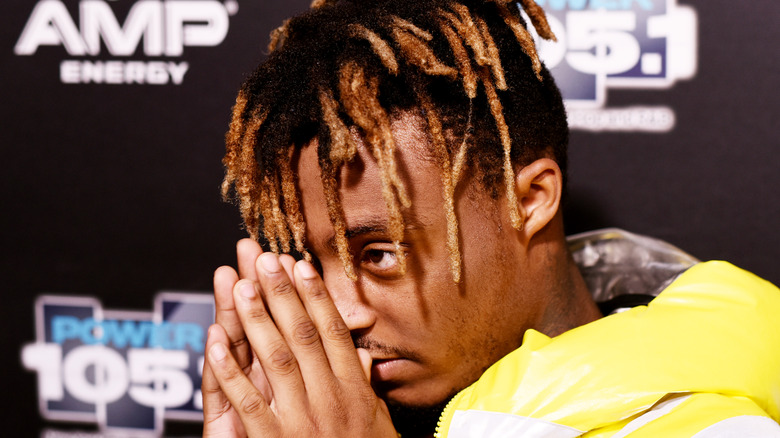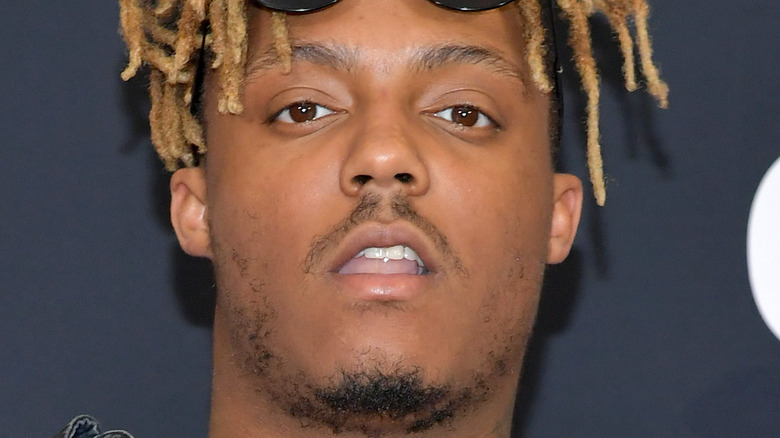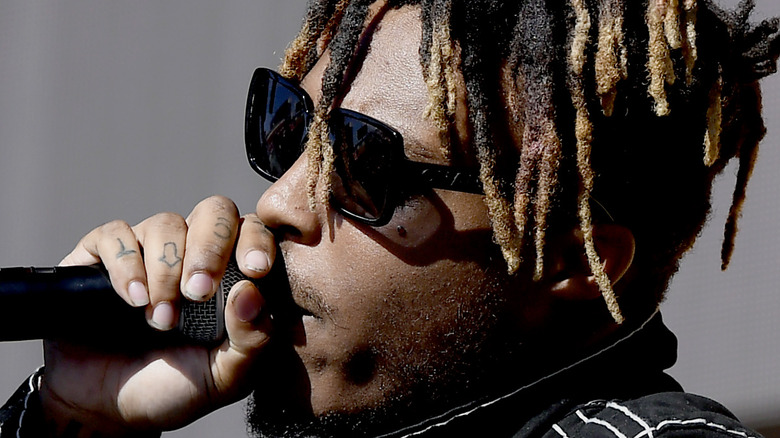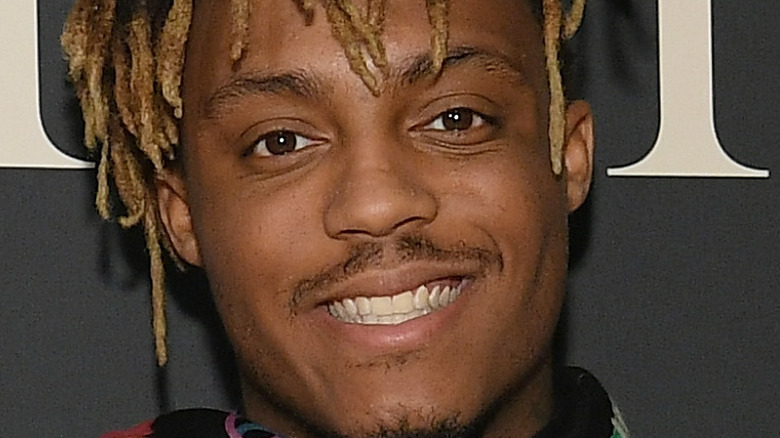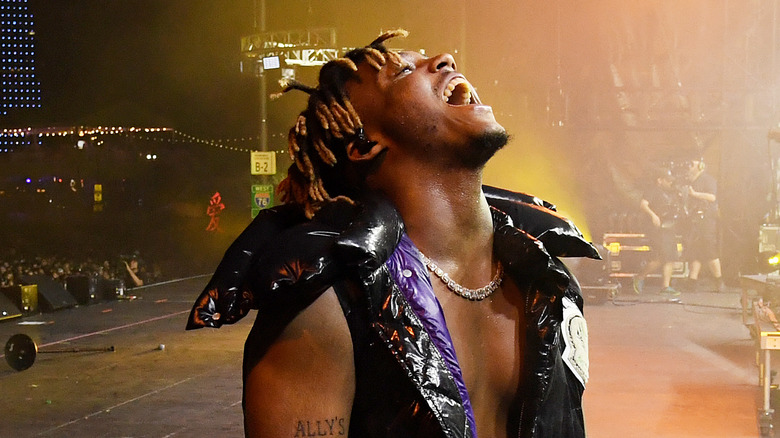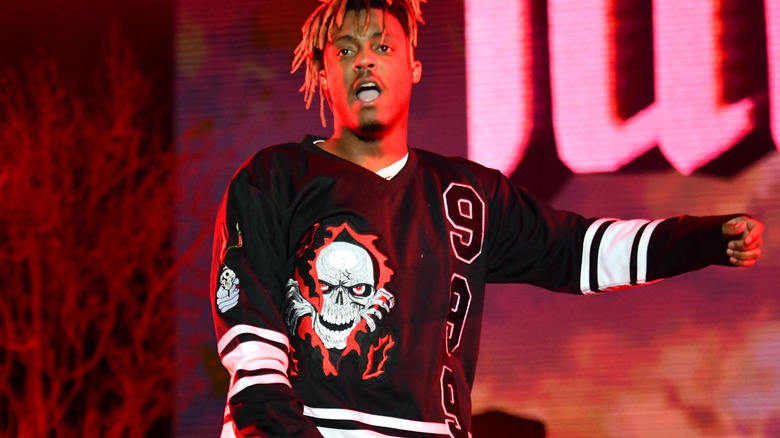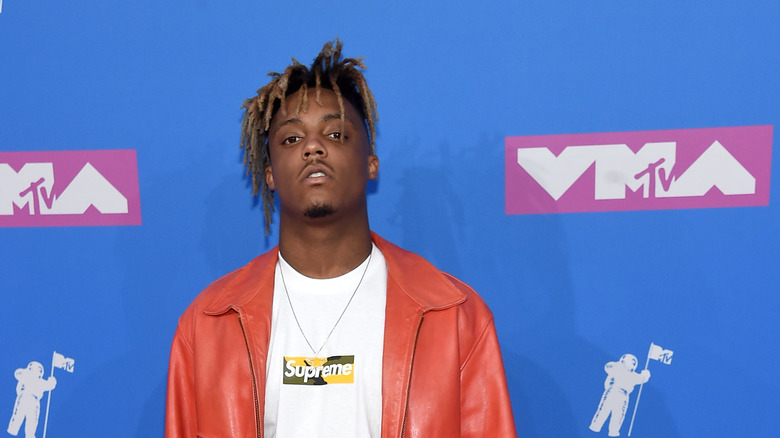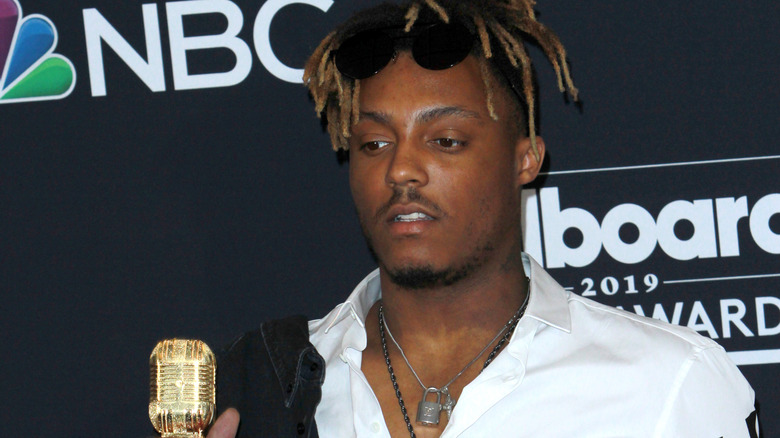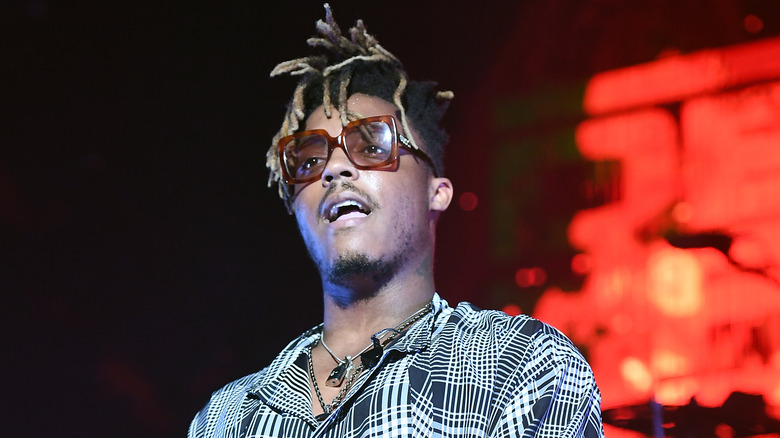The Tragic Real-Life Story Of Juice Wrld
Chicago rapper Juice Wrld would have been celebrating his 23rd birthday in 2021, were it not for his untimely death in 2019, when he passed away at just 21 years old. The rapper was aboard a plane from California to Illinois and suffered a seizure at Chicago's Midway airport upon landing, according to TMZ. He was later pronounced dead, shocking the music industry and fans. The artist was just on the rise as an up-and-coming young rapper, but his short-lived career didn't get to see the fruits of his labor.
A month after he passed, the Cook County Medical Examiner revealed that his death was an accidental overdose caused by use of codeine and oxycodone. Juice Wrld, who was born Jarad Anthony Higgins on December 2, 1998, joined the long list of American musicians who tragically died by drug use.
While his death came as a surprise to many, some of his most loyal fans were probably not too taken aback by the news. The rapper often spoke about his drug use in his music, and he even eerily predicted his death in his 2018 song "Legends."
Juice Wrld's dark lyrics predicted his death
Some of the now infamous lyrics of that song spoke about the rapper's desire to die young, and create a new and younger club of fallen entertainers. The lyrics included lines like these:
"All legends fall in the making
Sorry truth, dying young, demon youth
What's the 27 Club?
We ain't making it past 21"
The tragic 27 Club, as Rolling Stone explains, consists of young entertainers who died at 27 years old. But based on his lyrics it was safe to assume that Juice Wrld had no interest in going that far and probably preferred to go earlier. The song would subsequently chart a few weeks after his death, per Billboard.
He also spoke about his mental well-being in his music. In his first chart-topping hit, "Lucid Dreams," the rapper, who was also a singer, won over a lot of fans with the song about heartbreak. It was this song that placed him on the map, helping introduce many people to his music. The popularity of it earned him a spot to perform at the 2018 MTV Video Music Awards, reported Billboard.
Juice Wrld got sued for his famous hit
Just a few months before he died, Juice Wrld's blossoming career took a slightly tragic blow. Not everyone was a fan of his successful song. In October 2019, rock band Yellowcard hit him and his team with a $15 million lawsuit, reports Variety. They filed the suit claiming copyright infringement and alleged that his song "Lucid Dreams" copied the melody from the band's 2006 song "Holly Wood Died." Even after his unfortunate death, it seemed like the lawsuit would proceed. But the band dropped the suit against Juice Wrld's estate and co-authors of the song, according to Music Business Worldwide.
And that wasn't the only blow he got for that song. The song had also sampled (but credited) British rocker Sting's 1993 song "Shape of My Heart." And Sting was reportedly collecting 85% of the song's royalties, says the NY Post. Even though he had to share a very small portion of royalties with the rocker, Juice Wrld told NME it didn't faze him. It was less about the money and more about his artistry being acknowledged.
"I don't give a f*** about that, though. Money is gonna come regardless. If you doin' this for money, people gonna be able to tell. For me [it's more important that] Sting said my music is beautiful, the fact that he performed my version of the song," said Juice Wrld.
Juice Wrld battled a drug addiction
Naturally, after his early death, it was presumed that the rapper regularly used prescription drugs. His own mother later revealed that Juice Wrld was indeed suffering with an addiction, when she released a statement to TMZ a few days after he passed. "We loved Jarad with all of our hearts and cannot believe our time with him has been cut short. As he often addressed in his music and to his fans, Jarad battled with prescription drug dependency," said Carmella Wallace, Juice Wrld's mother.
Juice Wrld, and other rappers alike, often sang and glorified the recreational use of prescription drugs like percocet, xanax, and opioids. Sometimes artists also praised using these drugs with marijuana and alcohol, and potent mixtures like lean — a liquid codeine cocktail mixed with soda and candy. The addictive mixture is said to cause its users to feel high, dizzy, and even have seizures, says Healthline. The rapper's autopsy showed that he had codeine in his system.
Saw the posthumous entertainer fame
It seemed like his short time in the music industry saw quite a few legal ups and downs. He was still able to enjoy a lot of recognition. But like too many other fallen rappers, he became even more famous after death. His song "Lucid Dreams" would move up to the top of the charts, and streaming sites like Apple and Spotify saw an increase in listeners, reported USA Today.
Even though his death stunned the music world and brought attention to the dangers of drug-use, he didn't get the memorials or honor he likely deserved, says Forbes. Juice Wrld was signed to Interscope in 2018, and that same year and the following, he released two albums. His songs were charting and he saw a high level of success after being signed for less than two years. But according to Forbes, the 2020 Grammy Awards ceremony did not properly recognize his contributions to music.
Juice Wrld probably suffered before dying
The day he suffered his fatal seizure, authorities were also en route to search the plane that he was on, reported The Atlanta Journal-Constitution. The rapper and his entourage apparently had illegal guns and drugs aboard, and officials were tipped by the plane's pilot. When the plane landed in Chicago, FBI and FAA agents were waiting to search the plane. Juice Wrld swallowed "a large amount" of the opioid Percocet in an attempt to hide the medication from the authorities. His state of panic would have deadly consequences.
Juice Wrld likely suffered his medical episode as a result of swallowing the fatal dosage of drugs and went into cardiac arrest before being taken to the hospital where he died. Authorities did recover marijuana and firearms in their search, and arrested two of his acquaintances. The FBI allegedly began their search of his plane and belongings just before he started having a seizure, according to Revolt. In their own attempt to save him, agents administered two doses of Narcan. The rapper was briefly conscious but in a daze. He was transported to a hospital, where he was pronounced dead.
Sued after death
During the peak of his short career, Juice Wrld was sued for infringement by Yellowcard. But the group decided to drop the suit against his estate after his death, citing discomfort in proceeding with a lawsuit against an estate being managed by Juice Wrld's grieving mother. However, someone else wasn't so sensitive to that fact (via Loudwire).
In May 2021, an artist and producer named Ghost Loft filed a lawsuit against Juice Wrld's estate, stating that the rapper's song "Scared of Love" copied an entire verse from a song of his (via TMZ). In 2013, Ghost Loft released a song that he titled "So High." Then in 2018, the song's beat was sampled for Juice Wrld's single, and some lyrics were also taken in the process. Ghost Loft claims he was never credited for the song. As a result, his lawsuit comes after Juice Wrld's mother, who manages his estate; a co-writer of the song; as well as the two music labels responsible for the release.
Paperwork prevented Juice Wrld from pocketing more from his famous hit
Rapper Lil Bibby, who signed Juice Wrld to his label, Grade A Productions, would share an unfortunate and one of the many tragic up-and-downs the young rapper faced in his career. Juice Wrld's popular and famous Billboard hit "Lucid Dreams" was also one of his most controversial. The song attracted a lot of attention because an overwhelmingly large amount of its royalties were not even going to the rapper or his record label. Most of it was going to Sting. In his first sit-down interview with DJ Vlad after Juice Wrld's death (posted on YouTube), Lil Bibby explained that things would've been different if paperwork was done on time. According to him (via HipHopDX), during the final stages of the paperwork procedure, the song was already released and picking up streams. The incomplete documentation and the release of the song ahead of finalization led to Sting being able to profit 85% of its royalties.
Despite Juice Wrld himself coming to terms with the decision, Lil Bibby says Sting should donate a portion of the percentage that he receives. " ... He's gotta donate some money to my mom's charity. That was a huge hit ..." said Lil Bibby.
Juice Wrld's interest in rehab
The rapper talked a lot about using drugs in his music, and he also suffered from addiction. It was an illness that he was apparently aware of and even ready to seek out help for. In the same interview with DJ Vlad, Lil Bibby shared that before his death, Juice Wrld agreed to go to rehab.
He explained that after learning that Juice Wrld was regularly ingesting upwards of four doses of Percocet pills in one sitting, he raised the alarm because he had never heard of someone taking that much at once. "I get to telling people like, 'Look we got to send this kid to rehab.' I'm telling everyone because I'm thinking 'That's a lot.' Because all people I know only do at the max one," said Lil Bibby (via NME).
The rapper purportedly reluctantly agreed to go. But he also said he wouldn't stop his use of the drug, and would only lower his dosage. Sadly, he would never get a chance to get rehabilitative assistance for his addiction.
His posthumous musical releases
Oftentimes when an artist dies, some of their unreleased music is eventually released some point after their death. Juice Wrld joined the club as one those artists. A few months after he died, a deluxe version of his debut album was presented. Shortly after, his management team released his third album, titled "Legends Never Die," in July 2020 (via U Discover Music). It was the first posthumous album to come out under his name. Then it was announced that another project titled "The Party Never Ends," was expected to be released. But there was a slight delay and nothing came out that year. However, his fans finally got an answer regarding new Juice Wrld music. On December 9, 2021, his second posthumous album and fourth studio album, "Fighting Demons,” was released. It came out a day after the second anniversary of his death (via New Musical Express).
It's unclear how many more Juice Wrld projects will be released, but in the fall of 2021, Lil Bibby announced a documentary along with the new music, per Hypebeast. "Juice Wrld: Into the Abyss” is an HBO film showcasing footage of the rapper's life and interviews with people close to him. It premiered on HBO Max on December 16 at 8 p.m.
The effect of his death on his mother
The late rapper was the youngest of two sons raised by his single mother, Carmela Wallace. His mother revealed after his death that she was aware of his addiction because she happened to catch his lyrics one day on the radio. In conversations about his lyrics, Wallace said the rapper openly spoke to her about his illness and his coping methods (via GQ Magazine). His mother says she tried to get him help and before he died, Juice Wrld told her that he was preparing to get help. Sadly, that day didn't come. She would create an organization called Live Free 999 to help tackle mental illnesses and addiction in young adults (via Billboard).
Approaching the two year anniversary of his death, Wallace shared a letter on what would've been her son's 23rd birthday and illustrated just how much his loss has affected her. "Although it has been nearly two years since you've been gone, I still think about you every day and losing you has changed my life forever. I'm glad that we always made sure that we said goodbye when we left each other because we didn't know when we would see each other again," wrote Wallace (via People Magazine).
His childhood was tough
Born in the late 1990s, Juice Wrld was raised in the suburbs of Chicago, where he was privy to a robust and influential hip-hop scene, according to the Gulf Times. While emulating rappers like Chief Keef fueled his professional and artistic sides, Juice Wrld's home life was more tumultuous. His father was a rare and inconsistent presence, and he was raised almost entirely by his mother. "My dad would jump in and out every now and then," he told No Jumper. "My mom's pretty much been single parent-type s***."
According to Billboard, Juice Wrld's mother moved him around various schools on Chicago's South Side and other areas looking for a school where he felt comfortable and engaged. "Certain things about school turned me off. I got diagnosed with attention deficit disorder in fifth grade, which I completely disagree with," he said. "I was bored."
A Juice Wrld concert in Independence, Missouri, in June 2019 came to a halt upon the revelation that the rapper's father had died that day, just two hours before the show began. Juice Wrld broke the news on his Twitter account, writing, "D*** Rest easy dad pls rest easy rip."
He suffered from anxiety and depression
Juice Wrld spoke openly, in interviews and his music, about his personal, internal struggles, namely substance abuse. In 2018, the rapper's partner at the time, Alexia Smith, told The Daily Mail that Juice Wrld self-medicated for anxiety and depression, as well as a profound sense of aloneness, with prescription cough syrup and the painkiller Percocet. "He would tell me, 'I need help, I need help. I'm telling people I need help and nobody believes me,'" Smith recalled.
Carmela Wallace, Juice Wrld's mother, told GQ that a psychologist had treated her son when he was in his teens. In observation of the first World Mental Health Day after the rapper's death in October 2020, Wallace published an open letter (via Rolling Stone) about her son's struggles. "Jarad and I often had frank discussions about his struggles with addiction, anxiety, and depression," Wallace wrote. "I know he truly wanted to be free from the demons that tormented him."
Wallace also created Live Free 999, a resource guide for parents seeking help in addressing their children's mental health concerns. The foundation gets its name from a number frequently uttered by the rapper. "999 represents taking whatever hell, whatever bad situation or whatever struggle you're going through and turning it into something positive and using it to push yourself forward," Juice Wrld told MTV News in 2018.
If you or anyone you know is struggling with addiction issues, help is available. Visit the Substance Abuse and Mental Health Services Administration website or contact SAMHSA's National Helpline at 1-800-662-HELP (4357).
He left behind a lot of music
It's tragic when an artist dies, particularly when they die young and when they're just entering their creative prime, their death robbing the world of all the things they could have made and shared. Juice Wrld, just 21 years old at the time of his death in December 2019 (per NPR), was remarkably prolific, and he left behind a massive catalog of music, most of it unfinished, somewhat finished, and never to be fully finished the way he may have wanted.
As of May 2022, according to Forbes, there are roughly 3,000 Juice Wrld songs that haven't been officially released to the general public. A handful have made their way onto the internet, while others reside on the tapes where Juice Wrld recorded them, left behind at the studios around the world where the rapper would pop in for a bit just to lay down some tracks. Grade A Productions, Juice Wrld's first record label, operated by rapper Lil Bibby, has been entrusted with a lot of that music and keeping the legacy of the deceased musician. The company plans to put out some of the songs in the form of posthumous compilations as well as stage a yearly Juice Wrld festival, celebrating the musician's life and art.
